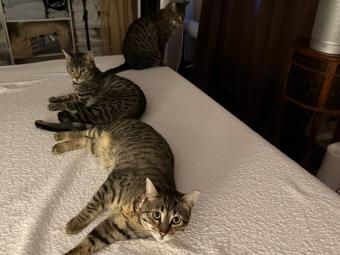
With the new year fully underway, many of us are looking at our budgets and wondering where all our money is going. For most, the problem is seemingly minor costs that add up quickly. This is good news because if you stopped buying these items, you would immediately see more money in your bank account every month.
So what are the things to stop buying to save money, and what are the alternatives to accommodate those needs? We break it down so that you can build up your bank account.
Single-Use Items
Single-use items are downright convenient, but as we all know, comfort comes at a cost. If you're looking to save money, it can be worth removing these items from your shopping list:
- Paper plates
- Plastic silverware
- Ziplock food bags
- Individual water bottles
- Small trash bags
- Single-serve coffee pods
After having children, I became an avid coffee drinker. Needless to say, I'm obsessed with my Keurig, so by no means am I saying to ditch the drink, just the way you make it. How? You can buy reusable K-cup pods that you can fill with coffee or tea bought in bulk. This can save you money, without taking away your favorite beverages.
By choosing reusable food containers and refillable water bottles, you will not only save money, but you'll greatly reduce waste on our planet as well!
Also, if you live in a state that offers plastic grocery bags, don’t throw them out when you get home. Instead, use them in your smaller trash cans. This is another simple and effective way to save money and the environment.
Laundry Products

Don’t get me wrong, the effects of dryer sheets and fabric softener are wonderful, but there are much more affordable alternatives that will not only soften your clothes, but they are also hypoallergenic and don’t leave chemical residue on your clothes.
Alternative Options
Did you know that white vinegar will not only soften your clothes, it will also whiten, brighten, and disinfect them? It can even help to remove pet hair! It’s a magical laundry solution that also helps remove stains and unwanted odors. Oh, and you can buy a gallon for under four bucks!
Dryer sheets can also be easily replaced with a ball of aluminum foil. Yep, goodbye static cling! The metal acts as a conductor, which means that the electric charge moves into the ball and off of your clothes.
Candles
I’m a sucker for a good candle, but this is another money-sucking product. Thankfully, making candles is a breeze, and plug-in wall scents can be a much more cost-effective way to freshen up your home. These products are designed to last for weeks, not days.
'Dry Clean Only' Clothing
Dry cleaning costs can be astronomical, so skipping the clothing that requires these treatments can save you hundreds, if not thousands, of dollars. Working in television for a decade, this put a big dent in my budget. And once I quit, I had hundreds of dollars back in my bank account every month.
Pet Treats

We all love to pamper our pets, but dog treats come at quite the cost. Many people don't realize that their pups can, eat some of the same food items that we are enjoying on our own plates.
I love freezing canned pumpkin and blueberries in silicone molds for my girls. This is not only healthier for them, but they are much more flavorful options!
Blanched green beans, broccoli, and carrots can be other fantastic options. And if you're looking to bump up the protein, plain scrambled eggs will get them drooling quite quickly!
Related: Homemade Dog Treat Recipes
Individual Bottles of Soap
With two toddlers and two dogs, I wash my hands a lot. This means we go through a lot of soap in our household. Another game changer for our budget was buying soap in bulk. With sensitive skin, I'm a sucker for Dove hand soaps, but they run a little over $4 for 12 ounces at the store. This was adding up quickly.
Thankfully, Amazon offers the same product in bulk — 102 ounces — for just under $20. This cuts the cost by 14 cents per ounce, which doesn't seem like much, but when you go through two 12-ounce soap pumps a week, that puts $171 back in your pocket at the end of the year!
Greeting Cards

It pains me to say it, but at $7 to $15 a pop, greeting cards are extremely overpriced. I want to be clear — that's not to say that you shouldn't send cards to loved ones and friends. Just that there are much more affordable ways to do it. How, you may ask?
- Find bargain deals at stores like HomeGoods and Hobby Lobby
- Make your own, adding in clever and meaningful messages from LoveToKnow's extensive Quotes & Quips collection
- Send e-cards to tech-savvy friends and family
- Reach out on Facebook with fun birthday memes
Brand Name Medications
Many people don't realize that the brand name doesn't matter when it comes to medications. For example, Zyrtec is the brand and Cetirizine HCl is the medication. As long as the generic store brand is the same drug type and dosage, there's no difference between the two products, besides the cost.
For example, Costco sells Zyrtec in bulk — 120 10mg tablets for $43. They also sell the same drug under the Kirkland name — 365 10mg tablets for $12. Triple the pills for just over a quarter of the price. Need I say more?
Taking the time to compare your go-to over-the-counter medications to generic brands can save hundreds of dollars every year.
Prepared Food Items
Those conveniently cut-up fruits and vegetables, premade kabobs, and even the prepped salads at the grocery store seem like a bargain deal until you compare the cost of the actual items in the plastic bin. Most of the time, there is quite an upcharge for having these foods prepped and ready to eat or cook.
How to Stop Buying Stuff That You Don't Need
It can be hard to resist snagging many of these items when you're shopping every week. Some of the best ways to limit your spending include meal planning with a budget in mind, using grocery pickup to prevent temptation, and taking an inventory of the products and services you don't really use.
For example, how's that gym membership treating you? And are you enjoying those hundreds of cable channels and the ten streaming services that are set up on your Roku? Asking yourself these simple questions can help you to identify areas where you can save even more money.







